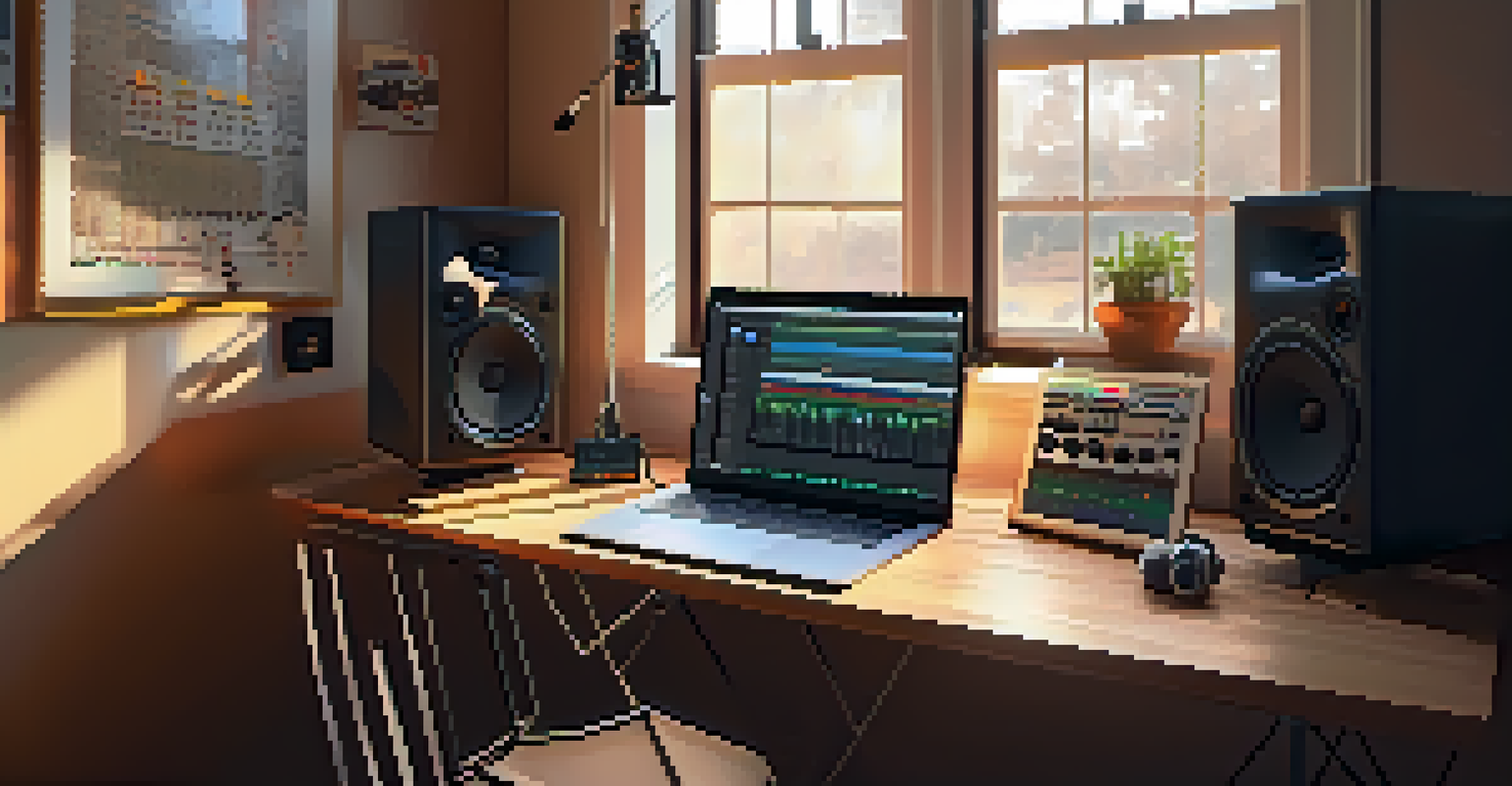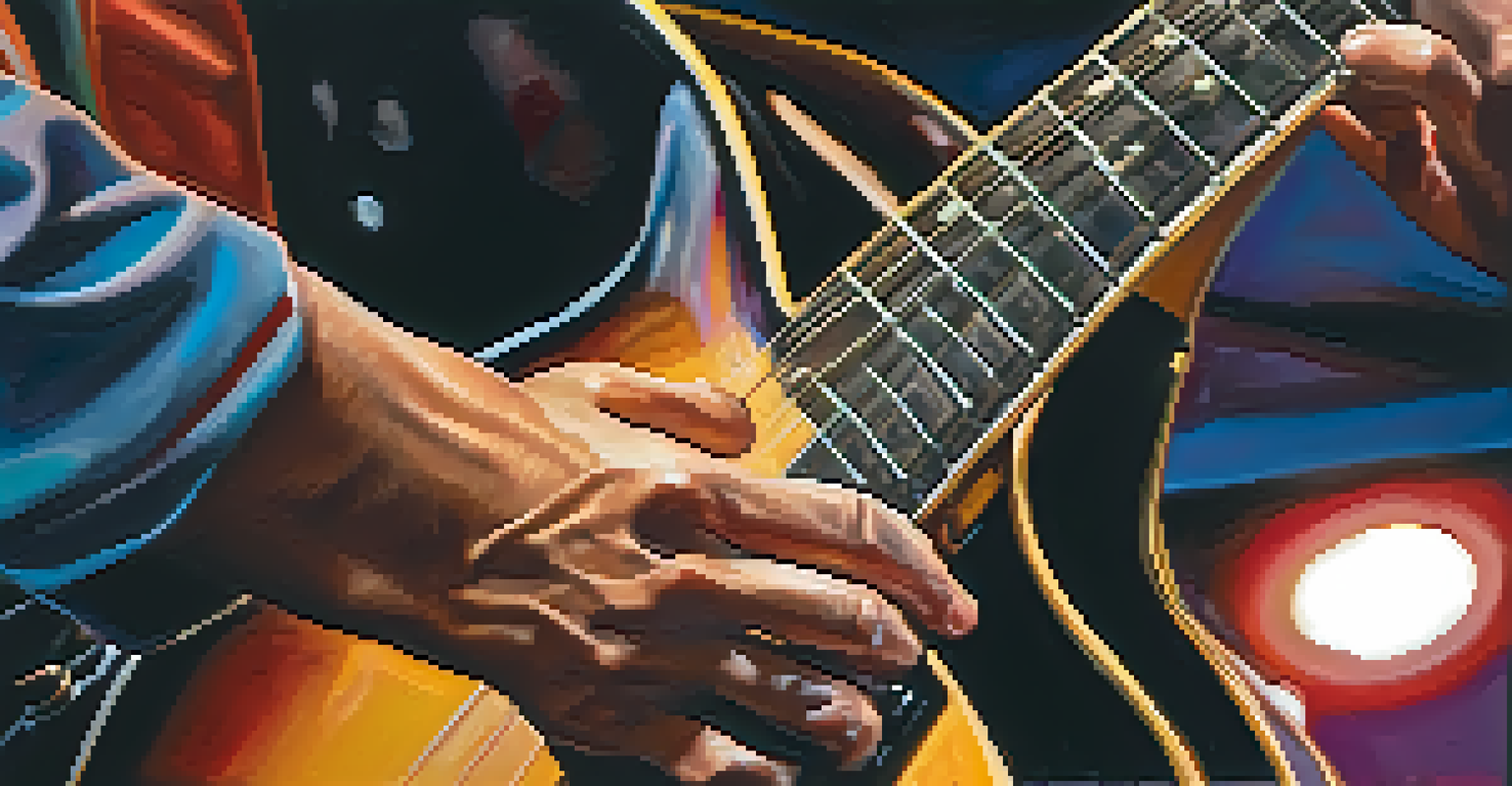How to Build a Successful Music Career Without a Label

Understanding the Modern Music Landscape
The music industry has evolved dramatically in recent years, providing independent artists with unprecedented opportunities. With the rise of digital platforms, musicians can now reach global audiences without the backing of a record label. This shift encourages creativity and self-expression, allowing artists to define their own sound and brand.
Music is the shorthand of emotion.
Many successful artists today, like Chance the Rapper and Billie Eilish, have built their careers independently, showcasing that it's possible to thrive without traditional industry support. They leverage social media, streaming platforms, and grassroots marketing to connect with fans directly. This landscape empowers musicians to take control of their careers and cultivate a loyal following.
However, navigating this landscape requires a strategic approach. Understanding your audience and the tools at your disposal is essential for success. By embracing the opportunities available in the modern music scene, you can carve out your own path and achieve your dreams.
Developing Your Unique Sound and Brand
Establishing a unique sound is crucial for any artist looking to stand out in a crowded market. Your music should reflect your personality, experiences, and influences, creating an authentic connection with your audience. Experimenting with different genres and styles can help you find what resonates most with you and your listeners.

Alongside your sound, building a personal brand is equally important. This involves creating a visual identity, consistent messaging, and a relatable persona that fans can engage with. Think of your brand as a story—what do you want your audience to feel and experience when they listen to your music?
Empowerment Through Digital Tools
Independent artists can thrive by leveraging digital platforms to connect with fans and share their music globally.
Remember, authenticity is key. Fans are drawn to artists who are genuine and relatable, so be yourself in your music and marketing efforts. By developing a unique sound and a strong brand, you'll set yourself apart from the competition.
Leveraging Social Media for Visibility
Social media has become an essential tool for independent musicians to promote their work and engage with fans. Platforms like Instagram, TikTok, and Twitter enable artists to share their music, behind-the-scenes content, and personal stories, creating a direct line of communication with their audience. This interaction fosters a sense of community and investment in your career.
The only way to do great work is to love what you do.
To maximize your impact, create a content strategy that showcases your music while also allowing your personality to shine through. Regularly posting updates, engaging with your followers, and utilizing trending challenges or hashtags can boost your visibility. Don’t forget to share user-generated content—fans love seeing their own contributions celebrated.
By cultivating a strong social media presence, you can build a dedicated fanbase that supports your music journey. Remember, consistency and authenticity are key to standing out in the crowded social landscape.
Creating High-Quality Music on a Budget
Producing high-quality music doesn’t have to break the bank, thanks to advances in technology. Today, many artists create professional-sounding tracks using affordable recording software and home studio setups. Platforms like GarageBand and Audacity provide user-friendly interfaces for beginners, allowing you to experiment and refine your sound.
Additionally, there are numerous resources available for learning about music production, from online courses to YouTube tutorials. Investing time in understanding the basics of recording, mixing, and mastering can significantly enhance the quality of your music. Collaborating with other musicians or producers can also bring fresh ideas and expertise to your projects.
Authenticity in Sound and Brand
Creating a unique sound and personal brand helps artists build genuine connections with their audience.
Ultimately, the key is to prioritize quality over quantity. Focus on creating a few standout tracks instead of a large volume of mediocre music. By delivering polished work, you’ll leave a lasting impression on your audience and industry professionals alike.
Building an Engaged Fanbase
An engaged fanbase is crucial for any independent musician's success. Start by connecting with your audience through live performances, whether virtual or in-person. Engaging with fans during shows creates a memorable experience, fostering loyalty and encouraging them to share your music with others.
Beyond performances, consider offering exclusive content to your fans, such as behind-the-scenes access, early releases, or special merchandise. Platforms like Patreon allow you to create membership tiers, providing fans with unique perks while generating a steady income. Remember, the more you invest in your relationship with your audience, the more they’ll invest in you.
Encouraging interaction through social media, newsletters, and fan clubs can also enhance your community. Regularly asking for feedback or involving fans in decision-making processes helps them feel valued and connected to your journey.
Utilizing Digital Distribution Platforms
Digital distribution platforms play a vital role in getting your music heard by a wider audience. Services like DistroKid, TuneCore, and CD Baby allow you to distribute your music to major streaming platforms like Spotify, Apple Music, and Amazon. This accessibility means that anyone, anywhere can discover your work.
Ensure your music is properly tagged and categorized so it reaches the right listeners. Creating engaging cover art and compelling descriptions can also make a difference in attracting attention on these platforms. The more appealing your presentation, the more likely listeners are to click and explore your music.
Networking is Key to Success
Building relationships within the music industry can lead to collaboration opportunities and professional growth.
Once your music is out there, promote it through your social media channels and engage in playlists and collaborations. By actively seeking exposure on digital platforms, you increase your chances of reaching new fans and generating streams.
Networking in the Music Industry
Networking is a powerful tool for independent musicians looking to build a successful career. Attend music events, showcases, and conferences to connect with other artists, producers, and industry professionals. Building relationships in the industry can lead to collaboration opportunities, mentorship, and valuable insights.
Don’t underestimate the power of online networking as well. Platforms like LinkedIn and music forums can be great places to engage with others in the industry. Joining groups or communities focused on music can help you share experiences, exchange tips, and find potential collaborators.

Remember, networking is about building genuine relationships, not just seeking opportunities. Approach conversations with authenticity and a willingness to learn. The connections you make today could lead to exciting opportunities tomorrow.
Staying Persistent and Adaptable
Building a successful music career without a label requires persistence and adaptability. The journey is often filled with challenges, setbacks, and unexpected twists. Maintaining a positive attitude and staying committed to your goals is essential for overcoming obstacles and achieving success.
Be open to feedback and willing to adjust your strategies as needed. The music industry is constantly evolving, and artists who embrace change often find new pathways to success. Whether it's experimenting with new sounds or adapting to shifts in digital marketing trends, flexibility can set you apart.
Ultimately, remember that every step you take contributes to your growth as an artist. Celebrate small victories, learn from setbacks, and keep pushing forward. With determination and a willingness to adapt, you can build a thriving music career on your own terms.